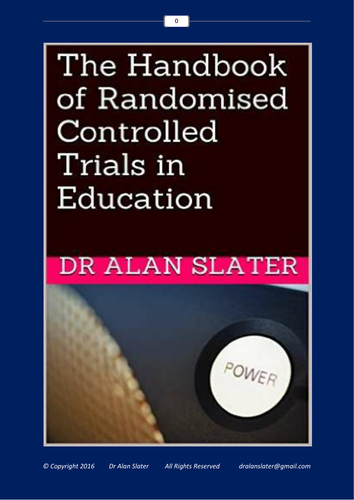
Anyone involved in education over the last ten years cannot help but have noticed that we are fast approaching a situation where we want ‘evidenced-based-everything’, we are expected to produce ‘best practice’, engage in ‘knowledge transfer’, roll-up our sleeves and get dirty ‘building evidence into education’.
Randomised Controlled Trials in Education can make a difference, but they cannot do it on their own. So, The Handbook of Randomised Controlled Trials in Education aims to give you insight into randomised controlled trials in education and in doing so it should be able to answer some, but not all, of your questions about such trials and the issues and evidence in and around them. The Handbook covers:
1. List of Tables and Figures
2. Introduction
3. What is a Randomised Controlled Trial?
4. Types of Randomised Controlled Trials
5. Advantages of Evidence from Randomised Controlled Trials
6. Limitations of Evidence from Randomised Controlled Trials
7. Examples of Randomised Controlled Trials in Education
8. Hierarchies of The Evidence
9. The Pyramid of Fate: The Fate of Research in Education
10. Questions to Ask Before Getting Involved in Any Randomised Controlled Trial
11. CONSORT and Research Ethics
12. Concluding Thoughts-This is Just the Beginning
Further Reading & References (including up to date material from 2016)
Randomised controlled trials (RCTs) are being seen as the best sources of evidence to make our professional lives more substantial, richer and more rewarding. RCTs cited in The Handbook are addressing real issues such as:
• Reducing the Likelihood and Impact of Cyber-Bullying.
• Incentives to Prevent Excess School Dropout.
• Getting Parents Involved in Their Children’s Education.
• Texting College Students to Help Achieve Their Goals.
• Does Reading During the Summer Build Reading Skills?
• Evaluating the Impact of Play-Based Learning on Early Childhood Development.
• Females in Science.
• An Intervention to Increase the Implementation of a Healthy Canteen Policy.
• Guidance and Information Affecting Decision Making and Demand for Education.
• School-based Prevention and Reduction of Depression in Adolescents.
• Vouchers to Move Out of High-Poverty Housing.
• Maximizing teachers’ ability to take advantage formative and summative assessments.
• Peer Observation, Teacher Performance and Student Outcomes.
• The Impact of Teacher Training and a New Curriculum.
Randomised Controlled Trials in Education can make a difference, but they cannot do it on their own. So, The Handbook of Randomised Controlled Trials in Education aims to give you insight into randomised controlled trials in education and in doing so it should be able to answer some, but not all, of your questions about such trials and the issues and evidence in and around them. The Handbook covers:
1. List of Tables and Figures
2. Introduction
3. What is a Randomised Controlled Trial?
4. Types of Randomised Controlled Trials
5. Advantages of Evidence from Randomised Controlled Trials
6. Limitations of Evidence from Randomised Controlled Trials
7. Examples of Randomised Controlled Trials in Education
8. Hierarchies of The Evidence
9. The Pyramid of Fate: The Fate of Research in Education
10. Questions to Ask Before Getting Involved in Any Randomised Controlled Trial
11. CONSORT and Research Ethics
12. Concluding Thoughts-This is Just the Beginning
Further Reading & References (including up to date material from 2016)
Randomised controlled trials (RCTs) are being seen as the best sources of evidence to make our professional lives more substantial, richer and more rewarding. RCTs cited in The Handbook are addressing real issues such as:
• Reducing the Likelihood and Impact of Cyber-Bullying.
• Incentives to Prevent Excess School Dropout.
• Getting Parents Involved in Their Children’s Education.
• Texting College Students to Help Achieve Their Goals.
• Does Reading During the Summer Build Reading Skills?
• Evaluating the Impact of Play-Based Learning on Early Childhood Development.
• Females in Science.
• An Intervention to Increase the Implementation of a Healthy Canteen Policy.
• Guidance and Information Affecting Decision Making and Demand for Education.
• School-based Prevention and Reduction of Depression in Adolescents.
• Vouchers to Move Out of High-Poverty Housing.
• Maximizing teachers’ ability to take advantage formative and summative assessments.
• Peer Observation, Teacher Performance and Student Outcomes.
• The Impact of Teacher Training and a New Curriculum.
Something went wrong, please try again later.
This resource hasn't been reviewed yet
To ensure quality for our reviews, only customers who have purchased this resource can review it
Report this resourceto let us know if it violates our terms and conditions.
Our customer service team will review your report and will be in touch.
£14.99
